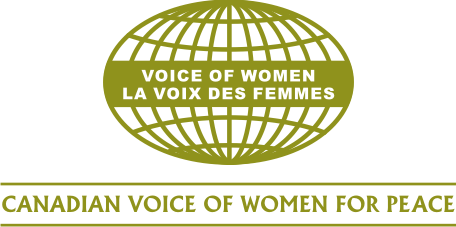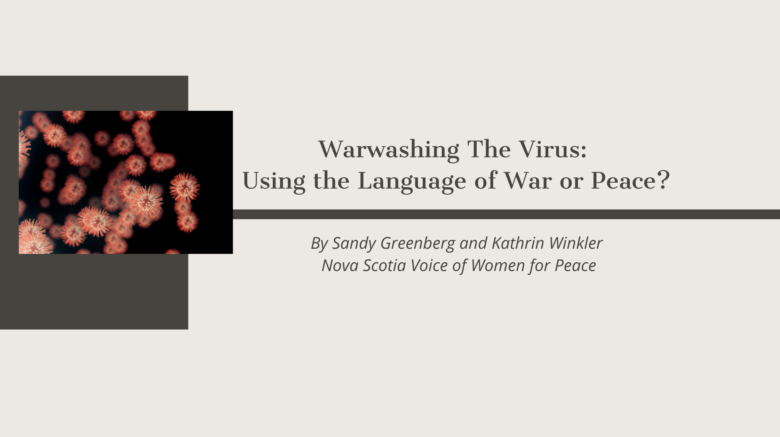The language of war is surging in the daily media headlines. As our fears crest in this pandemic, we are being roused to defeat the enemy on the battlefield. Hospitals are described as war zones for our frontlines. We’re told to order seeds online for victory gardens. Are we warwashing our collective response to COVID-19 by militarizing it? Reaching back to World War II rhetoric builds on a false foundation for what could become a better world.
We are in an unprecedented situation. Our understanding of safety, security and vulnerability is shifting under our feet. The pause button is stuck under the weight of COVID-19, and this collective limbo means our normal plans and goals are on hold. Some of us are actively engaged in protecting and helping, others are watching from the windows. Before we start revving the engines once again (hopefully retrofitted for green energy), let us take a moment to reflect on the language of war we are using during this stillness.
Warwashing uses the language of war to describe the real heroism in our hospitals in these exceptional circumstances of a world brought to a halt by the virus. Why are we normalizing a weaponized and aggressive description of the humanitarian response to the global human dilemma we are facing? There is no enemy far away. This virus has no geographical or human barriers and its impact can’t be refashioned through the rhetoric of patriarchy. It is not selective. It is not fought on distant shores. In fact, it is teaching us what global really means.
If we do reference WWll, we need to remember what that war was like for everyone—not simply the victors and not only the soldiers. We know that women’s experience on the receiving end of a war-threat system was anything but glorified. Evoking ‘the war’ metaphor without any reference to intersectionality, gender and power dynamics, is an attempt at erasure. Lest we forget, some of the ‘successful tools’ of WWll, and every war since, have been rape, the use of terror and the destruction of infrastructure.
Lest we forget. War organizes around and develops weapons that kill. Soldiers are trained in battlefield skills for killing, even as they are surrounded by death. In order to kill, empathy has to be checked at the door. And for this, the warriors themselves may later pay a high price in the currency of PTSD. Health care administrators, researchers, and patient-care workers organize, develop tools and are trained in the healthcare field to save lives and alleviate suffering for all. For the work of healing to take place, empathy must be present, and it is manifesting in the incredible concern and self-sacrifice that we are witnessing throughout this land.
Another myth that warwashing generates concerns resources. The military does not have stockpiles of the medical supplies needed in this emergency, yet we believe it is ready to defend us. We pour funding into the Department of Defence as if our future conflicts will be solved by the military. In fact, future conflicts will look just like this pandemic. Don’t imagine that there is
defence against a nuclear holocaust either. The irony remains that we do have tools of negotiation and human hope to lessen the risk of human-made instruments of destruction. However, we seem to be paralyzed from reaching possible solutions because we imagine our ‘enemies’ are selective targets ‘out there’. But the virus is teaching us that the enemy is not out there beyond an imagined border. We are moving into brave new territory and in this post-COVID-19 world, safety is being redefined for us. In a post COVID-19 world, investing in hospitals, decent wages for caregivers, ventilators, masks, gowns and medical expertise are the acts that can provide real protection. Practicing prevention would include signing the United Nations Treaty on the Prohibition of Nuclear Weapons.
Realizing that the Department of National Defence can’t actually defend us, we might question the plan to increase military spending by 73% to C$32.7 billion by 2026-27. How can we consider spending 19 billion for 88 fighter jets? Instead, we should be budgeting for COVID-19 relief efforts, military families and veterans. We have to re-think protection in a post pandemic world hunkering down in a climate crisis. What we need is medical equipment and facilities on this unceded, Indigenous land right now, rather than Gripen jets consuming fossil fuels at a cost of US $4,700 per flying hour. How many doctors and nurses could we train for the cost of one fighter jet? If we thought clearly, we could see that the primary function of our nation’s military could be providing troops and equipment to deal with natural disasters and pandemics. There are endless possibilities for the dedicated personnel of the military in this changing world. We acknowledge that efforts in this direction have begun.
Maybe, just maybe, the language of UN Resolution 1325, a language of gender inclusion and peace, is better suited to the challenge of these days. This landmark United Nations Resolution on Women, Peace and Security stresses the importance of equal participation and full involvement by women in all efforts for the maintenance and promotion of peace and security. In post-crisis re-construction, all voices are needed. Participation, prevention and protection in decision making and helping one another will be critical. And let us not forget the incredible protection that women are providing us right now. Four out of five hospital workers are women.
Let’s leave behind the language of fight or flight, and move toward the language of tend, mend and befriend. Daily we read about caring and concern for one another in our communities. Our leaders are leading from the heart, and our gratitude is rippling out to the heroes of the day – our health care teams, our farmers, truck drivers, grocery store and sanitation workers, and yes, our politicians. We are grateful. We will remember. Let’s shower their footsteps in light and goodness by heeding any measure humanly possible to protect all of us and our families. And, yes, let us plant gardens – peace gardens.
Before we go order Dr. Strang t-shirts online to match the periodic table dress (à la Dr. Deena Hinshaw, Alberta’s Health Minister) with that great polka dot blazer (à la Dr. Theresa Tam, Canada’s Chief Public Health Officer), we want to be clear. We have been propelled into the arms of public health care. Let’s accept the arms of care instead of the boots marching on the ground. The incredible efforts all around us on behalf of humanity are not acts of war. They are acts of love. The white peace poppy is looking pretty good on that blazer.
Sandy Greenberg and Kathrin Winkler
Nova Scotia Voice of Women for Peace

